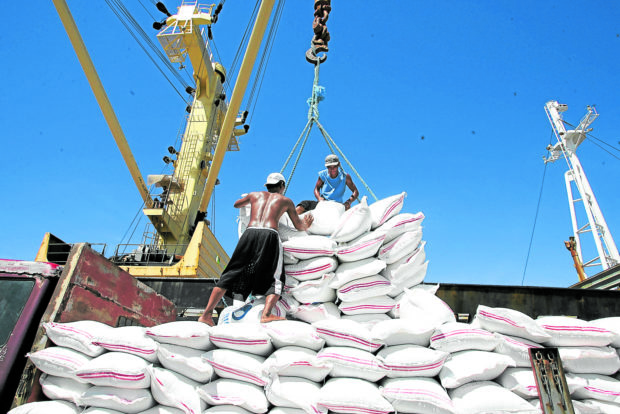Marcos extends lower duties on vital food imports
MANILA, Philippines — In a bid to ease inflation and ensure “access to food” for Filipinos this holiday season and in the months ahead, President Ferdinand Marcos Jr. has approved a recommendation to extend lower tariff rates on rice and other vital food imports up to the end of next year, Malacañang said on Sunday.
Marcos’ predecessor, Rodrigo Duterte, issued Executive Order No. 171 last May which lowered tariffs on rice and other food imports. But the reduced rates contained in the order were due to expire at the end of this year.
The National Economic and Development Authority (Neda) said an inflation rate running at 14-year highs warranted an extension of the tariff reprieve until Dec. 31, 2023, to help keep consumer prices in check.
That means the tariff rate for imported rice will stay at 35 percent, while the import levies on corn and pork products will remain at 5-15 percent and 15-25 percent respectively, according to a statement from the Office of the Press Secretary.
These are down from 40-50 percent for rice, 35-50 percent for corn grains, and 30-40 percent for pork.
Article continues after this advertisementAs for coal, a key fuel in the country’s power generation sector, the tariff of 1-7 percent will be at zero beyond the end of next year, but this will be reviewed twice a year.
Article continues after this advertisementIn a statement by the Office of the Press Secretary, Economic Planning Secretary and Neda Director General Arsenio Balisacan was quoted as saying that “through this policy, we shall augment our domestic food supplies, diversify our sources of food staples, and temper inflationary pressures arising from supply constraints and rising international prices of production inputs.”
He also cited such external factors as the geopolitical conflicts abroad, above all, Russia’s invasion of Ukraine.
‘Poor and vulnerable segments’
Republic Act No. 10863, or the 2015 Customs Modernization and Tariff Act, empowers the President — in the interest of general welfare and national security, and upon the recommendation of Neda — to increase, reduce or remove existing rates of import duty.
Balisacan said the extension of lower tariffs on vital food items would “provide relief to poor and vulnerable segments of the Filipino population whose welfare is reduced because of high inflation.”
“Through the temporary reduction of tariff rates on selected key commodities and our continuous efforts to address constraints in our value chains, we will ensure that Filipino families will have sufficient access to food, especially this holiday season and in the coming months,” he added.
At 8 percent in November, consumer price inflation is well beyond the Bangko Sentral ng Pilipinas’ (BSP) target range of 2-4 percent for this year and the medium term.
Monetary authorities have already raised interest rates seven times this year by a total of 3.5 percentage points to 5.5 percent, and BSP Governor Felipe Medalla said more hikes were coming in 2023 to bring inflation back to within its target.
Higher interest rates help dampen consumer spending and, in turn, control upward price movements.
The rate of increase in the prices of goods and services is expected to further rise in December from the 8 percent recorded in November, according to the BSP.
Balisacan said persistently high inflation remained a challenge because of its adverse effects on the purchasing power of households, especially the poor.
He said the key to tempering these effects was to ensure food security in the short and long term through timely importation and addressing long-standing supply-side constraints in the agriculture value chains.
Economic blueprint
Balisacan said food security and protecting people’s purchasing power remained the government’s top priorities, noting that these are vital components of the Philippine Development Plan (PDP) 2023-2028, which covers Marcos’ term in office.
The Neda Board approved on Dec. 16 the economic blueprint aimed at reinvigorating job creation and accelerating poverty reduction.
“More importantly, the plan seeks to effect economic transformation toward a prosperous, inclusive, and resilient society,” he said.
With the PDP 2023-2028 approved, another draft EO has been prepared to instruct all government agencies to align their respective programs, projects, and activities with the plan.
Amid a subdued global economic outlook in 2023, Balisacan said he anticipated favorable economic conditions for the Philippines in the near term. He said these included the expected reopening of China’s economy, moderating global oil prices, easing of aggressive monetary policy tightening, and sustained remittance inflows.
